#dialogue problems
Explore tagged Tumblr posts
Text
Good writing advice for dialogue to keep in mind!
Dialogue Tags Aren’t the Problem, Your Dialogue Rhythm Is
friendly reminder that the word “said” did not kill your scene.
you don’t need to replace every line of dialogue with “he rasped” or “she intoned” or “they gasped breathlessly” (please no). your dialogue is not dying because of your tags. it’s dying because the rhythm is off.
👀 let me explain:
✨ what is dialogue rhythm?
it’s the flow of speech between characters. the beats. the pacing. the way words bounce, interrupt, cut off, trail, clash. it’s less about the words themselves and more about the energy they carry.
dialogue rhythm is what makes two people arguing feel like a boxing match, or a confession feel like a car crash. it’s how you keep tension in the room. if your rhythm sucks, no amount of fancy tags is gonna save you.
🔪 signs your dialogue rhythm is off:
every character is speaking in full, polished sentences like it’s a staged play
nobody ever interrupts, stammers, hesitates, or doubles back
the emotional pace stays flat, even in high-stakes scenes
all the action beats are “he nodded” “she smiled” “they looked at her” over and over
you read it out loud and it feels like a middle school skit
👂 here’s how to fix it:
Read your dialogue out loud. Like, actually out loud. if it sounds robotic, it is robotic. listen for places where people would realistically pause, ramble, get cut off, or trail off. insert those beats. add the mess.
Use white space and formatting to control speed. short lines = fast pace. long blocks = slow burn. a line break right before someone says something unhinged? elite move. example: “You really think I’d betray you?” Pause. “You already did.”
Cut 30% of your dialogue. if you can remove the line and nothing breaks, it was filler. chop chop. more silence = more tension. not every reply needs a full answer.
Let action interrupt speech. don’t wait for the character to finish talking before you show what they’re doing. intercut body language or physical actions mid-line. it mimics how people actually talk. like this: “Don’t touch that—” she lunged forward, grabbing his wrist. “—you don’t know what it is.”
Stop overexplaining with tags. you don’t need to say “she shouted angrily” if the line is literally “GET OUT.” trust the line. if the dialogue’s strong, “said” works just fine. if the dialogue’s weak, “murmured” won’t save it.
🛑 but what about dialogue tags?
use them! but treat them like punctuation, not prose. the goal is clarity, not ✨flair✨. you want the reader to know who’s speaking without noticing the machinery.
“Said” is invisible. “Snarled” is a spice. Use spices sparingly.
better yet: mix tags with beats to keep rhythm tight. example:
BAD: “I hate you,” he said angrily. “I hate you,” she snapped back.
BETTER: “I hate you,” he said, jaw clenched. She didn’t even blink. “Good. Then we’re even.”
💡 TL;DR: your scene doesn’t need fancy tags. it needs movement. conflict. silence. interruptions. character-specific tone. you fix that by fixing the rhythm, not the verbs.
go back to your WIP, open your messiest conversation scene, and test it. read it aloud. break it up. cut what drags. add one beat of silence. give someone a half-finished sentence and a reason to storm out.
watch how fast it starts to breathe.
P.S. I made a free mini eBook about the 5 biggest mistakes writers make in the first 10 pages 👀 you can grab it here for FREE:
🕯️ download the pack & write something cursed:
#writingtips#dialoguehelp#writingadvice#thewriteedvice#authorcommunity#writerblr#writeblr#writingskills#amwriting#dialoguetricks#writing tips#writing advice#how to write dialogue#dialogue tips#writing help#writing community#authorblr#creative writing#fiction writing#character dialogue#scene writing tips#story pacing#editing tips#dialogue problems#writing rhythm#tumblr writers#thewriteadviceforwriters#writers and poets#writers on tumblr#writers block
722 notes
·
View notes
Text
Slow Burn Realization Prompts
✶ “when did it happen? when did i start looking at you like that?”
✶ “i think i always knew, i just didn’t want to ruin it.”
✶ “you’re the only constant in my chaos.”
✶ “everyone else faded. you stayed.”
✶ “you laugh, and something in me aches to keep you happy.”
✶ “i didn’t mean to fall for you. i just... tripped into it, slowly.”
✶ “i watched you fall asleep one night and everything just clicked.”
✶ “i tried to convince myself it was just friendship. it never was.”
✶ “i think the scariest part is how much sense you make.”
✶ “and then one day, i looked at you and thought: ‘oh. it’s you.’”
#writing#writerscommunity#writer on tumblr#writing tips#writing advice#character development#writer tumblr#writblr#writing help#prompt#writing prompts#fic prompt#writing prompt#dialogue prompt#writeblr#indie writer#writebrl#writer#writer problems#writer community#writer stuff#writer things
2K notes
·
View notes
Text







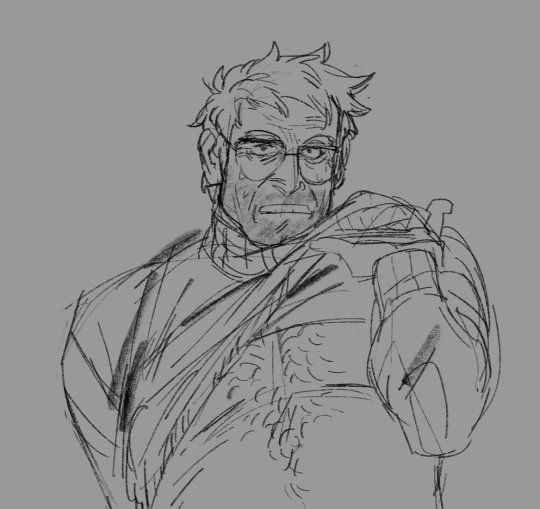
grunkle attack
#gravity falls#grunkle stan#grunkle ford#stanley pines#stanford pines#draws ford lifting his shirt twice. whatever#mystery sack under bill lol#daekiyu art#sibling banter dialogue based on ford comparing his physique to stan in journal 3... ford ur so mean what is ur PROBLEM#edit. im glad u guys like my bill censor i drew him on my phone🫶
3K notes
·
View notes
Text


Currently haunted by @dreamweave01's RotTMNT Separated AU. I couldn't stop thinking about Raph's backstory; it's so horrifying. I had to draw something about it.
Thanks for the shell reference, DW!
Went with the more pointy version of Raph's kraang hands, based on the baby CJ post:

#Raph gets the hug he deserves 😤#he can't apologize to his Leo. but he can apologize to this one#now whether or not he realizes he doesn't need to is an entirely different problem#posting this now before I can refine this sketch into oblivion any more#as per usual I overthought literally every word of dialogue here#tryna write what comes naturally but then i'm like “what if it only sounds normal to me though?”#this is my first time drawing the turtles with tails#i think i did okay?#rottmnt#rise of the teenage mutant ninja turtles#art#tmnt#sketch#seperated au#comic#eggbem's art
1K notes
·
View notes
Text




FORGETTABLE-AU (page 82-85)
THAT LAZYBONES!!
[BEGINNING] [PREVIOUS] [CONTINUE]
#So sorry it took me almost 2 weeks to post these#I was busy irl but ALSO I had too much fun doing extra art and forgot to work on these for like 3 days lmao#NOW THIS TIME I DO HAVE SOME THING TO SAY#YAY RIVERPERSON! SO MANY PEOPLE GUESSED CORRECTLY!#It wasn't that hard#We know Papyrus knows the river person#are they friends? idk BUT I PERSONALLY THINK THEY ARE#I just LOVEEE looking at the dialogue and making connections#I referenced one of the lines from the river person here...sometimes they'll ask you if you know any game you can play with a dog...#They said they were “asking for a friend...”#And I couldn't help but think about Papyrus' problem with the annoying dog LMAO#+ Papyrus seems very excited to know if the river person is there when you call him nearby that area#Okay so... now ...some comic thing that I made up but also didn't...#“FLOWEY DOESN'T KNOW WHO THE RIVER PERSON IS?”#okay so...#I feel like#It's not very common for them to be there...#When talking with Undyne around that area it's kind of *unclear* if she knows about the river person being there....#She tells you about the river connecting different areas and that you should “jump in”#She then clarifies that's the only thing they got for public transport#AND LIKE? It's unclear if she's telling you to jump in the boat (OR IF SHE KNOWS THERE'S SOMEONE WITH A BOAT) or is she's literally telling#you to jump in the river?????#Anyways...so...that's that#HEHE Flowey and Papyrus finally arrived at the house! WOHOO#Sans is too lazy to bring his old stuff to the surface! (or does he still think he'll end up back in the underground eventually?)#undertale#undertale comic#forgettable-au-comic#papyrus#flowey
2K notes
·
View notes
Text
pony thieves 💥💥



au notes ⬇️



#akechi rank 8 but its mlp magic duel style 😭😭😭#pony akechi gave me hell when i was drawing him o(< hes literally so hard for me to draw in every shape and form. whats this guys problem#so is makoto pony actually but its okay i forgive her#ANYWAYS IM IN THE MIDDLE OF PLAYING P5 TACTICA DUDEEE DUDE ITS SO CUTE#theyre such little bugs in this game#started the dlc yesterday and seeing fresh royal trio content after finishing p5r brought tears to my eyes#my son (akira) my daughter (sumi) and this guy they brought along (akechi)#sorry im kidding hes my favorite character i swear#halfway through the dlc i had to pause and log off bc the dialogue options were killign me why are they so flirty its actually sickening#<- shuake fan who cant stomach seeing them interact on screen#persona 5#persona 5 royal#p5#p5r#akira kurusu#ren amamiya#ryuji sakamoto#ann takamaki#shujin trio#yusuke kitagawa#makoto niijima#futaba sakura#haru okumura#goro akechi#sumire yoshizawa#my art
2K notes
·
View notes
Text

How to avoid character inconsistency in your writing
Set your character boundaries:
What's the background?
What's your character's backstory?
What are their traits, and how do they portray them?
Know what keeps your characters motivated. (Are they reaching their goal?)
You can avoid quick shifting of scenes. Let your readers absorb the setting of the scene.
Ensure that their actions and decisions align with their development and growth.
Tip 1: Start your chapter with a scene or dialogue that comes back at the end, which helps maintain consistency.
Tip 2: Throughout the chapter avoid the fast pacing of the story, rather let the characters express themselves so that it's clear for the readers.
Consider how your characters react to situations that are hard to convey. (Do they feel nervous? Scared? Fearless?)
Dialogue writing is crucial in explaining your character's personality while writing a story.
This process requires lots of re-reading and writing, fixing character holes and rewriting character arcs.
#writeblr#writers on tumblr#creative writing#writing prompts#dialogue responses#writing inspiration#writing advice#writer help#writer tips#writer problems#writer community#writer on tumblr
3K notes
·
View notes
Text




Sketch dump of month old sketches I forgot to post
#fanart#my art#sketch#isat siffrin#isat loop#isat isabeau#isat spoilers#isat#isat fanart#in stars and time#isafrin#sifloop#I think those were kind of supposed to be here#isat au#two hats spoilers#human loop#Seafoam#The Start and the Epilogue#I'm in a sort of stasis rn#At least when it comes to isat#Worked on learning new stuff so hard it pulled me out of fandoms and gave me a headache#Also I have run into a problem of me hating writing#Specifically writing dialogues I like setting the atmosphere more and dialogues feel flat in my head#And writing a visual novel would require like 80% of dialogue#And making an rpg mode or something would require making an entirely new set of sprites different from the OG sprites and I'm struggling#At least for now#But hey I'm learning music I'm getting better#Isn't that great#I want to lie down and cry#Anyway I'm going back to sleep
479 notes
·
View notes
Text
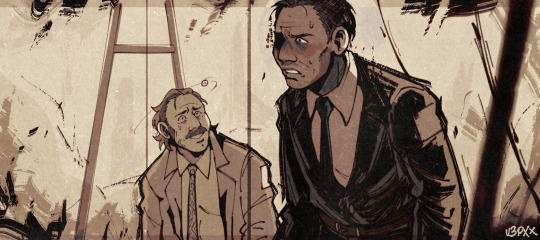
KIM KITSURAGI - “Is that. My kineema.”
COMPOSURE [Medium: Success] - Something in him is about to break, *big time*.
EMPATHY - And it’s not going to be pretty, do something!
- DRAMA [Formidable] - Everything is fine!
- “Sure is.”
DRAMA [Formidable: Failure] - Surely he’s aware that he’s not the *only* person in the world who owns a Kineema?
YOU - “Is it really *yours*? I mean, plenty of people have their own Kineemas, right? Like working men, government offices, uh, firefighters I guess, maybe even animal control people? Exactly! A million different people who could’ve driven it into the uh…”
DRAMA - Pause, my liege! Ixnay on the Ineemakay!
YOU - “It could even be our *mysterious* joyrider!”
KIM KITSURAGI - Your frenzied babbling falls deaf to the lieutenant's ears. Instead, he approaches the broken vehicle, sunken in the ice. He moves with a caution and gentleness you haven’t seen him display before.
INLAND EMPIRE - It must be cold and lonely down there, in the icy water. Maybe he could sense its sorrow, calling to him…
PERCEPTION (SIGHT) [Easy: Success] - His hands, which are always stiffly placed behind his back, are trembling.
ENDURANCE - This is the shuffle of a tired, tired man.
HALF LIGHT - He’s going to do something drastic because of you. Oh god, terrible! You’re a terrible liar! You can’t look at this, you just can’t!
VOLITION [Formidable: Success] - It's not *you* who drove his kineema into the sea. You have plenty of faults, but this one is decidedly not yours.
KIM KITSURAGI - He kneels down with his head bowed, casting his face in shadow. He plants a hand on the ice to stabilize himself, squinting to get a better view of the motor carriage. “Detective, it says ‘57’ on it.”
YOU - Sweat drips down your brow, and you feel a terrible headache coming. “Maybe our joyrider has an affinity for that number?”
LOGIC - He's not stupid, he knows that it's not that.
KIM KITSURAGI - “57.”
YOU - “What about 57?”, you brace yourself.
KIM KITSURAGI - “Precinct 57.”
YOU - You wince. “Kim, look-”
KIM KITSURAGI - “When I woke up in the Whirling-in-Rags with no memory of what happened during the days before, I've taken note that something of mine has gone missing.” He grits his teeth. "A very. Important. Something."
He runs his hands over his face, messing his already unkempt hair in the process. Regret creeps up on his features. “God. Fuck. They’re going to fire me over this, they’re not going to hear me out.”
EMPATHY - Desperation settles in the lieutenant's tone. Sadly, you find yourself in agreement, even if you don’t want it to be the truth.
YOU - “People are more valuable than machines, Kim.”
KIM KITSURAGI - “Not people like me.” He rasps.
YOU - “…”
KIM KITSURAGI - Before you can say anything more, you fail to notice the lieutenant carefully walking onto the edge of the ice. He looks over the frigid water, a dizzying blue that mirrors and distorts his exhausted face back to him.
YOU - “Kim?”
KIM KITSURAGI - Seconds pass as he looks to be contemplating something. Out of nowhere, he casually takes another step where the ice ends and the sea begins. It happens all too quick for the lieutenant to even voice a call for help— if he even wanted to — his body plunging into the cold water before your eyes.
YOU - “KIM!!!!”
uhhh bonus stuff? sorry i have swap au brainworms pfttt
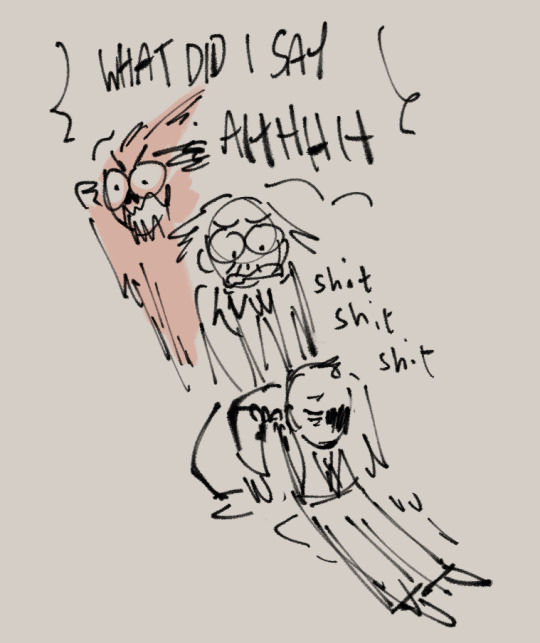
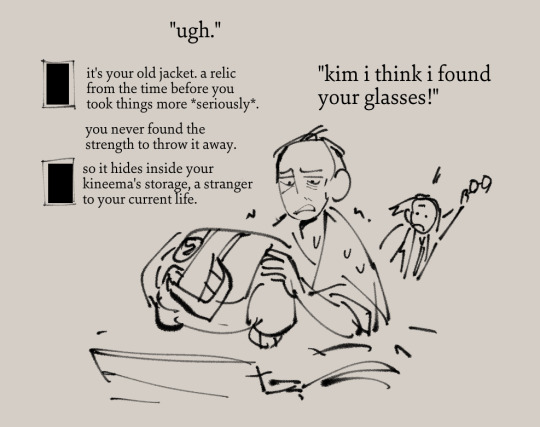
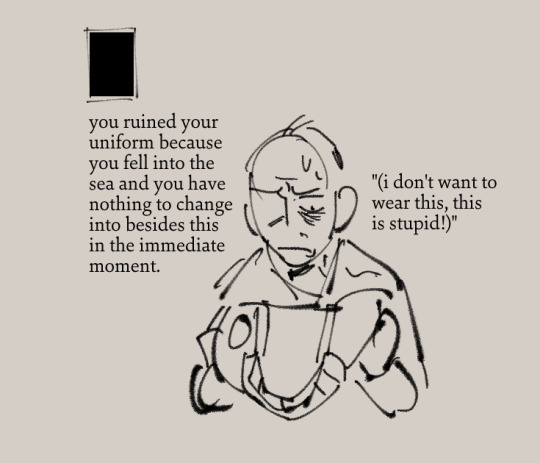
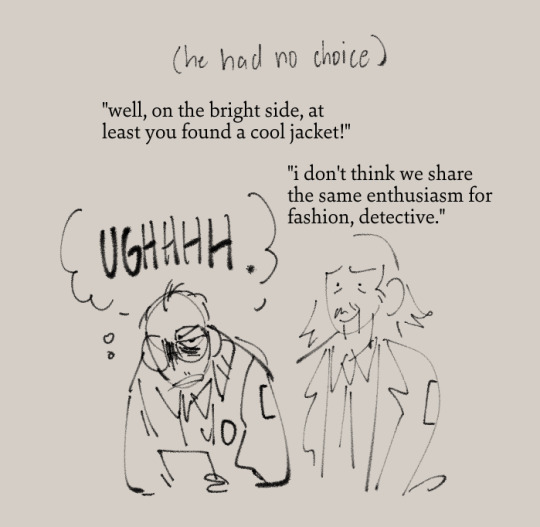
(im not sure what skills kim has at the moment so rn he only has narration as his inner monologue ok whoops, i would like to keep harry as the guy who thinks in dialogue trees so im still figuring it out pfttt)
also, this was done bc i wanted to expand on these old scribbles of mine, just like an idea, i just think that he'd be having an even worse time wheezes
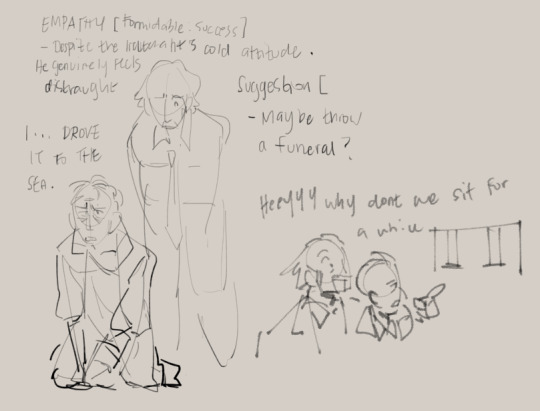
#disco elysium#kim kitsuragi#harry du bois#den's disco swap#disco elysium role swap#HI nobody look at the fact that. i am a novice writer at best DFGHJFGH#i had idea for some comic dialogue but it ended up being this instead whoops. i mean i could still draw this as a comic#anyways. i was like. trying to reverse engineer my idea of how kim can change into his bomber jacket instead of his uniform.#which. i dont think you can do with just simple convincing bc that thing is fused to him in spirit so there has to be like a good reason wh#oh it gets ruined! how? it gets like wet or smth! how'd that happened? he threw himself into the sea#also isnt it fitting that my memory problems is making me not remember the things that happen in disco elysium very well wheezes#so whoops if the characterization is a lil off lmaoooooo#but i have been trying to figure out how i want harry to be in this swap au#i dont think he's as well as he wants you to believe he is. and just the image of him pushing this 'youre allowed to be in denial about +#this' to kim about the kineema was so vivid in my head and idk if that tracks but hell. its in there now dfghdjfg#sunnysidedraws#sunnysidedisco
2K notes
·
View notes
Text
whump responses to "I'm sorry"
whumper
"For what? Let me hear you say it."
"You don't even know what 'sorry' is. Not yet."
"Really? Then beg me for forgiveness. Then we'll see how I feel." (bonus if Whumper makes them get on their knees)
"I don't care. This is happening either way."
"It's okay. I have a feeling you'll make it up to me."
"Good. You know you did wrong. I guess that means you're ready to accept your punishment?"
"No, you're not - you're sorry you got caught."
"You fucking should be."
"Prove it."
caretaker
“Hey, no big deal. What are friends for, right?”
“Whumpee, I told you, you don’t have to apologize for this kind of stuff. It’s alright.”
“Jesus, Whumpee, ow! I get that you’re nervous, but I need you to not throw a punch whenever people get close!”
“You don’t have to apologize for that. I of all people understand.”
"Shhh, I know, lie back down. You really need to rest. We'll talk about it later, okay?"
“You know what, don’t even apologize, I’m just glad to see you finally standing up for yourself.”
“Um, for what?”
"It's fine." (It's obviously not)
“It’s okay, I guess I need to remember not to sneak up on you.” [nervous laughter]
"Don't apologize, I got the food for you. You can have some whenever you want, okay?"
"Nah, it's no prob - oh shit, are you crying?"
#the problem with these is once i start i feel like i can just keep going and going and going#and then idk what's actually good anymore LOL#whump#whump ideas#whump scenario#whump prompt#whump dialogue#caretaker#whumper#whumpee x whumper#whumpee x caretaker#whump writing#recovery whump#my prompts
212 notes
·
View notes
Text
I gotta gush about something from the Residence, the White House murder mystery on Netflix starring Uzo Aduba. (Spoilers ahead but as far as I know they’re spoilers for character backstory but not for the plot of the show, though I’m only on episode 4 so idk if this comes into play later.)
Okay so there is a thing that writers sometimes do when trying to convey backstory to the audience where they have the characters just explain their backstory to someone. But often they are doing this to someone who would already know, like a family member/partner/longtime friend. You know I love my man Taron, but Netflix’s Carry-On did this with his character and his girlfriend multiple times. Like who’s been dating their partner for 2 years and says things like, “You moved here to be with me. That was 2 years ago.” It’s awkward and unnatural because people don’t talk like that to each other. They both already know that! But it’s hard because you want to tell your audience the story.
So, on to the point of this post. The 4th episode of the Residence opens with Cordelia on a birding trip with her nephew, who I think is somewhere in the 10-12-year-old range. He’s discouraged and wants to give up because they can’t find the bird they’re looking for, and Cordelia tells him about not giving up while looking for a lost sock.
She tells her nephew that his mom (her sister) had a favorite pair of socks as a child. She’d wear these socks every other day, even if they were dirty. Her nephew asks what was so special about the socks and Cordelia says, “They were a gift from her brother.” Her nephew’s face gets serious. Cordelia goes on to talk about how distraught her sister was when one of the socks was lost. She wanted to skip school to find it. She cried. Cordelia promised to find it and skipped school to look for it. She says, “I even looked in places I wasn’t supposed to look” and we see a closed door that a child-Cordelia opens to reveal a boy’s bedroom in an obviously untouched state. At one point in the story she mentions a neighbor bringing food by for the family even after her dad didn’t want the neighbor to do that anymore.
Neither Cordelia nor her nephew ever say the brother died. Because they don’t need to. In real life, you don’t need to remind your 10-year-old nephew about your brother who died. He knows, and he’s not a younger kid who would blurt it out just because he knows it. Instead of going for the unnatural “let me talk at you so we get character backstory through dialogue”, the show gave us the hints we needed and trusted us to put the pieces together ourselves.
We still get the backstory they wanted to tell us, but it doesn’t stand out as a weird conversation between family members. It’s so much more natural and I’ve been thinking about it all day because it was so refreshing. I feel like so. many. shows these days spoon-feed the audience every single detail and it leaves the dialogue feeling awkward. It was so nice to have a show say “here, you’ve been alive long enough that you can understand what we’re saying.” And we can! It was not particularly subtle, despite never actually saying the words. It was just really good!
#the residence#writing#sorry to the carry-on writer it was just the first example off the top of my head#and that expository dialogue drove me nuts bc it was SO heavy handed#the Tahiti convo too like why would you need to say ‘you’ve always wanted to go to Tahiti and I always promised I’d take you’ to your gf#do you both have amnesia so you constantly have to remind each other of your relationship?#and I know at least some of this spoon-feeding is not the fault of the writers!#I know studios are demanding it more and more bc they think people won’t pay attention to the show#and yeah a lot of people won’t#but I like that the residence said ‘not my problem if you weren’t listening’#hooting and hollering over smart writing like my team’s scoring in a playoff game lmao
298 notes
·
View notes
Text
Anyways, I have my reasons for thinking they'd be chill

#similar opinions on specific things#my work#devon yaps#elden ring#similar reasons for disliking the current problems. similar opinons on their children and kinda themselves?#the way some of their dialogue mimics one anothers is just..... ughhhhh *slams head through a wall*#count ymir#lady tanith#rya the scout#zorayas
293 notes
·
View notes
Text
“We Shouldn’t, But...” Prompts
⊹ “say we stop now, and I’ll stop… but don’t lie.”
⊹ “one more second like this and I won’t be able to pretend anymore.”
⊹ “tell me this is wrong while looking me in the eye.”
⊹ “we’re alone. no one has to know. just this once.”
⊹ “you’re standing too close.”
⊹ “don’t touch me unless you mean it.”
⊹ “you keep looking at me like that and I’ll do something we can’t take back.”
⊹ “this is dangerous. that’s why you like it, isn’t it?”
⊹ “if you walk away now, I swear I won’t stop you.”
⊹ “your breath on my neck is driving me insane—move or I will.”
#character development#writing#writerscommunity#writer on tumblr#writing tips#writing advice#writer tumblr#writblr#writing help#oc character#writing prompts#fic prompt#dialogue prompt#writing prompt#writer#writer community#writer problems#indie writer#female writers#writers on tumblr#writers and poets
1K notes
·
View notes
Text
An animatic I've been working on for a while now!! This is the first time I've ever tried making something like this n I hope u guys like it!! >_<
#sv 4 life#if any of u pause and look at the little details like dialogues I've written down n stuff u get +3million B points IMMEDIATELY#I had sm fun making this but alsoo it was kinda draining bc I DREW SM (╥﹏╥)#speedran this bc I rlly wanted to finish it lol#I had more audios but idk if I'll do those :0#svsss#scumbag system#scum villain#the scum villain's self saving system#shen qingqiu#liu qingge#luo binghe#shang qinghua#mu qingfang#yue qingyuan#bingqiu#liushen#cumplane#svsss fanart#mxtx#mxtx fanart#mxtx svsss#animatic#yayy!! :D#I am so proud of this hehe#okay it's late time to go to bed#no sv season two? no problem#I'll animate it myself#<- what a lack of official content does to a person#Skipsart
342 notes
·
View notes
Text
is this what you call subtly flirting. do they even know they’re subtly flirting.

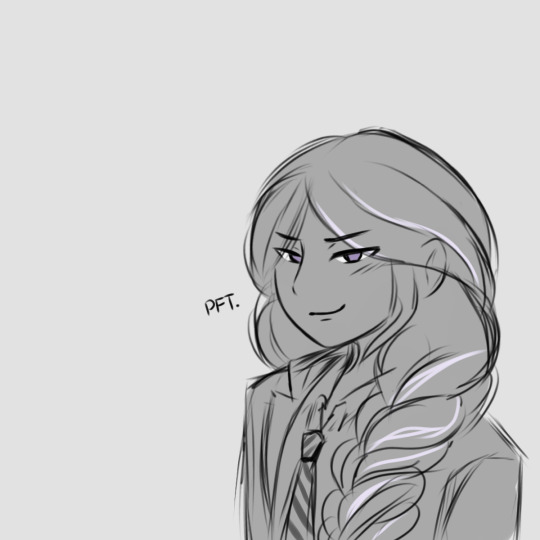




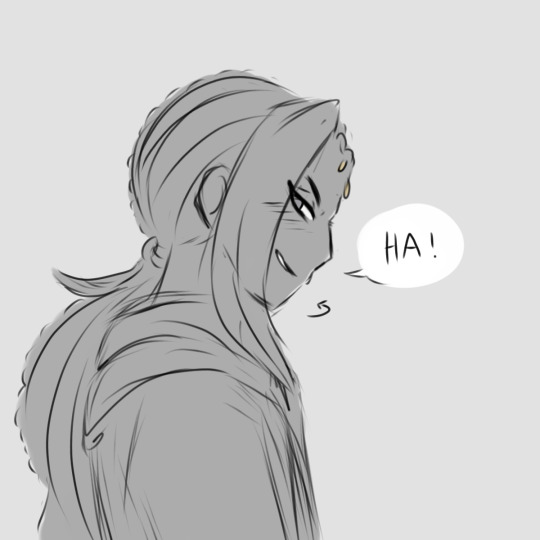


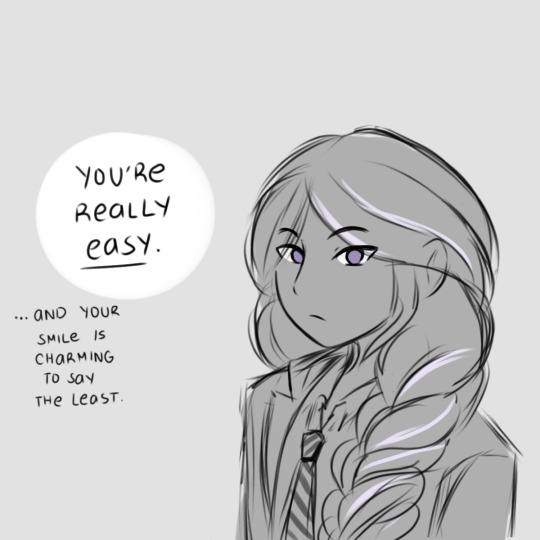




jamil i think u forgot ur ( parentheses )
#what!! is wrong with them !!#since when did jamil have the moves#correction: since when was he willing to use those moves on HER#both of them can dish it but neither can take it#give jamil like 0.2453 seconds to realize what he just said#[—✦-#twst#twisted wonderland#twst art#twst fanart#jamil viper#jamil x yuu#jamil viper x yuu#jamiyuu#twst oc x canon#twst yuu#twst yuusona#(💜) yuusha tala#(💜) curry noodles#-✦—]#every now and then im getting worried im moving on from drawing for twst#but the next thing u know an impulsive idea makes me black out for a few hours and suddenly there's this small comic in my drafts#twst was never the problem it’s just irl 😭#i will return in (checks calendar) 2-3+ weeks#i also didn’t know when to post this#this has been in the drafts for at least a week??? idk#i think it’s bc the dialogue just felt off to me 😭#i’m getting rustyyyy help#(✧) my art
193 notes
·
View notes
Text
Writing Theory: Dialogue
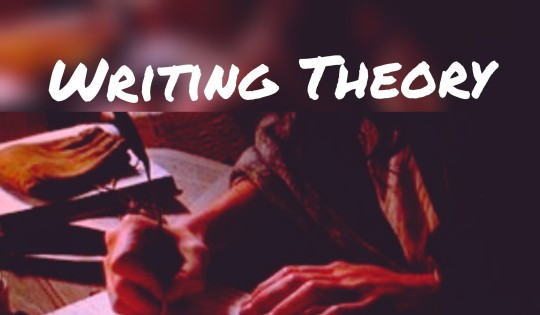
One question, I often get asked on this blog concerns dialogue and how to write it. Dialogue is the characters speaking to one another or even to themselves and while it sounds easy, it can be difficult to chose what your character might say or how they might say it or even how it might present on the page/word doc/napkin you're writing it on.
Content: The What and Why
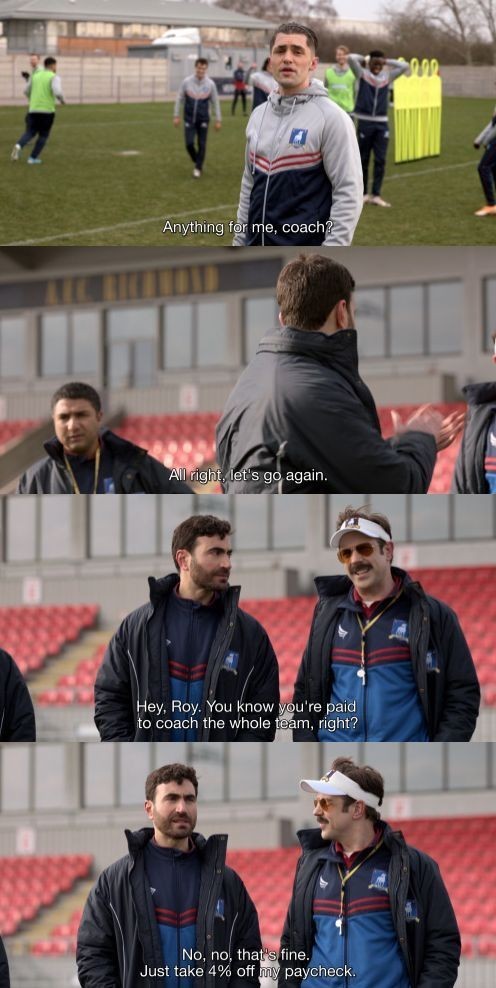
What is your character actually saying? Your character is in a situation (which hopefully you put them in or at least know what is going on, if you do not, it is OK). But in most situations, most characters interact in some way, whether it is verbal or not. What your character says has to link to the situation in some way. Picture yourself on a bus sitting next to a friend and you have just seen a dog out of the window. What would be the response or the natural line of conversation here? Probably 'Oh, that dog is cute.' or 'This journey is taking forever.' etc. It unlikely would be a long monologue about a character's deepest darkest secrets or an admission of murder. It is unlikely, but of course not impossible. But generally, one usually tries to keep the conversation to the present and the now. Allow your character to get their point, or even part of it, across to who they talking about clearly. Remember not only does their companion need to know what is being said, but as do your readers.
Why is this person saying this? There is a deeper level to what anybody says and we all know this. A person will generally keep to neutral phrases or topics in order to keep the peace, distance themselves from whoever they are having the conversation with or a person will be curt and short with somebody they are not getting along with or a person will be polite and formal to somebody who demands the respect. There is a reason behind word choice, a reason behind tone and even topic. You won't have to delve into the intricacies of the 'hello' or 'hey' types of dialogue but say if a character was in a situation they must or do chose their words carefully, then you have to consider the why of it as you write the conversation.
Characteristics of Speech
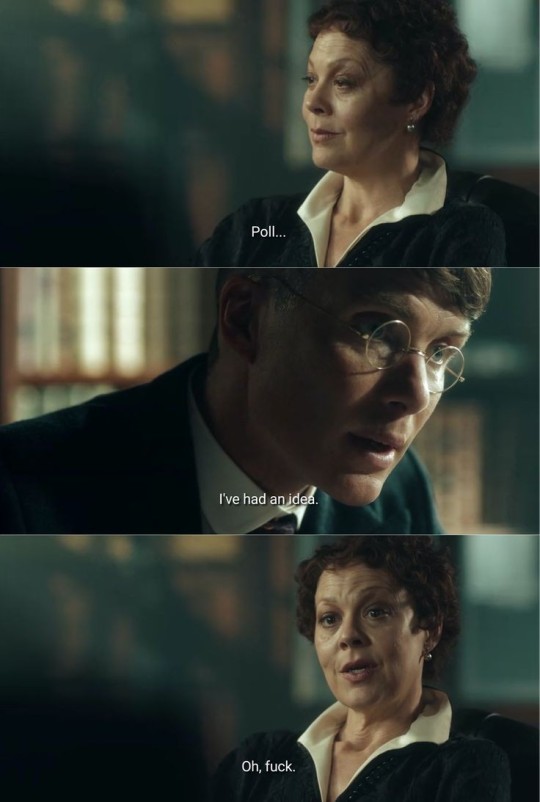
Characters don't talk like they are reading from an instruction manual. Personality, experience and other factors effect how your character might speak. Next time you are in a group setting, focus on how the people around you speak, whether its the sentence structure, the tone, the volume or the flow of their words. No character speaks the same as another, and nor should they. I go further into this in this post here. Now you have established your character's voice as it pertains to personality, now consider the actual voice of your character. How would you describe your character's voice? Even if you don't include a description of it in your narrative, you should have some idea of how your character speaks. Some people have gravelly voices, high pitched voices, clear, garbled, etc. You can of course, fan cast a voice if you wish. The way your character speak can give away things about them as people. Contractions, slang and colloquial phrases are often used to denote those of working class or poorer factions whether the lack of them, including a larger vocabulary, are often attributed to a wealthier, more educated class. You can say a lot about somebody by the way they speak and is an important tool in the entire show don't tell deal. Speaking of...
Showing, Not Telling when Your Character is Yapping
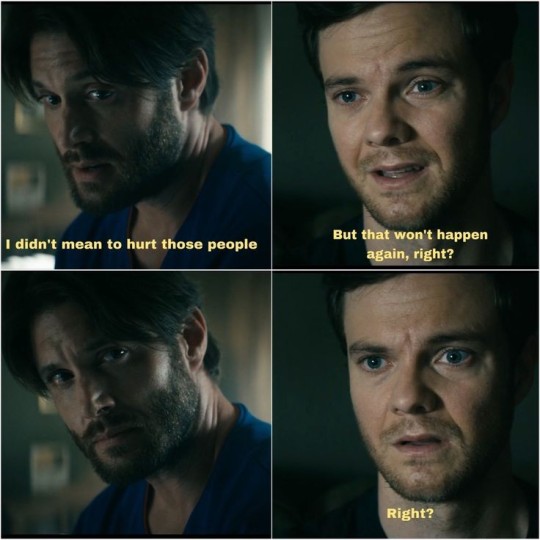
People don't often come out with what they really want to say. Thankfully or else I would be unemployed and in jail.
Concealment: Like I said before, characters will sometimes chose words or specific tones when speaking or breaking off at certain points to conceal what they are thinking. The dialogue might look something similar to using different approaches either with a character trailing off before the offending phrase (...) or catching themselves (-) or hesitating/considering their words/pausing before speaking. It doesn't often mean a character is being evasive, they may be avoiding harming somebody's feelings.
Class/Social rank: Like I said above, the way somebody speaks can be an indication of their status in society. This is not a bad thing, we have different ways of speaking because we come from different walks of life, we have totally different experiences. Writing the character's voice with this in mind can indicate your character's background.
Nationality/Culture: As in the real world, we don't all speak the same language, it makes us who we are and marks out our culture and place in the world. Phrases, sayings and specific words or even pauses to consider the wording or sentence structure can denote a character from having a different mother tongue or culture than those around them. Your character may sometimes have to tailor what they say to somebody of a different culture or nationality even if they speak the same language. For example, if I'm writing a post here or in my WIP, I often have to steer clear of slang, sentence structure. grammar structure and phrases that non-Irish people are not familiar with.
Emotion: Emotion and dialogue walk hand in hand, a character will not speak without some emotion behind it and most emotions make us want to say something. Anger will make our words sharper, harsher, more abrupt. Happiness will make words flow faster, more positive and sometimes even jumbled. Grief will make one sound disconnected, numb and unable to think straight. The way your characters speak can tell your reader and the rest of the cast able to read their emotional state even if they cannot see their face or your helpful dialogue tags.
Sensibilities and Personality: Word choice and avoidance of certain words can tell somebody a lot about the person speaking. Somebody who avoids cursing or using 'vulgar' language might be considered proper, mannerly and formal. Somebody who does might be judged. Somebody who avoids topics that are considered taboo is somebody who aligns to social norms and expectations while somebody who tends to venture into incendiary topics is likely not and more free willed. These are not bad things but it can tell you a lot about the person speaking or in the way that person responds to somebody's words.
On Dialogue Tags and the Controversy of 'Said'
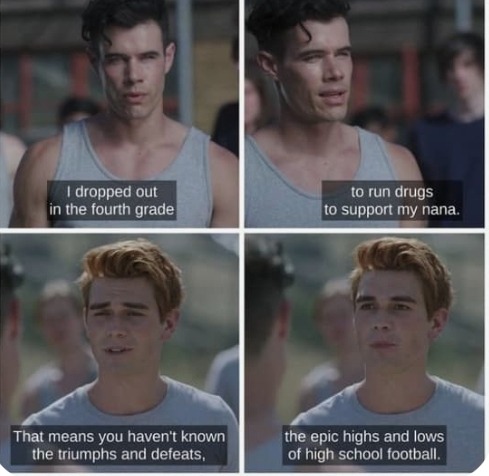
(nobody would ever fucking say that)
I don't buy into this drama over dialogue tags. Some writers will denounce them, some swear by them and they have been arguing over this as often as we do about the Oxford Comma. The real truth is that it is up to you. It is not a cardinal sin to use them and there is nothing - NOTHING - wrong with using the word said. There are of course some dialogue tags I personally hate and some I love but there is nothing wrong with the word 'said' or 'says'. Here are a few commonly used tags.
A
Accused: Used to pin the blame on somebody.
Added: Usually used when the character is adding to something they or somebody else has said.
Agonized: When a character is distressed over something.
Agreed: Used when a character allows something or agrees with something that is said.
Acknowledged: Used when giving voice to a fact.
Announced: Used for a statement.
Asked: Posing a question
Answered: To address a question.
Addressed: When a character draws attention to something or draws the attention of somebody.
Affirmed: Used when a character is stating an opinion or fact.
Apologized: When a character is saying sorry for something.
Approved: When a character is giving their support to a fact or something somebody has said.
Articulated: When a character expresses a thought/idea.
Asserted: When a character affirms an opinion firmly.
Advertised: Used when a character is drawing attention to something.
B
Babbled: Used when a character is talking excitedly, often nonsensically.
Backtracked: Used when a character is going back on something they have said.
Badgered: Used when a character is nagging another.
Bawled: Used when a character is crying out, usually wildly and very loudly.
Bellowed: When a character is shouting.
Began: When a character begins a sentence or thought.
Bemoaned: When a character complains of something.
Bit: Used when a character is being sharp with something that is irritating them or angering them.
Blamed: Used when a character is assigning blame for something.
Bleated: When a character is complaining or moaning, usually used in a derogatory way.
Blurted: When a character says something without pause or thought.
Boasted: When a character displays self-pride.
Boomed: When a character speaks loudly.
Broadcasted: Used when a character is announcing something, usually loudly.
C
Called: When a character cries out for somebody.
Chanted: When a character speaks in a monotone or often repeating words over and over.
Chattered: When a character speaks rapidly, usually out of nerves or excitement.
Chastised: When a character rebukes another character.
Cheered: Used when a character is excited or pleased about something.
Chimed: When a character adds something to something already said.
Choked: Used when a character is having a difficult time getting the words out.
Chuckled: When a character laughs slightly.
Chortled: When a character laughs slightly and breathlessly.
Coughed: When a character’s breath catches.
Croaked: Used when a character’s voice is strained or dry.
Crowed: When a character boasts loudly about something.
Cried: When a character exclaims or weeps.
Cursed: When a character use swear words or denounces another character.
Cautioned: Used when a character warns somebody.
Complimented: Used when a character is lavishing praise on somebody.
Condemned: When a character denounces something.
Considered: Used when a character is thinking aloud.
Conferred: When a character discusses something with another, usually quiet.
Commented: Used when a character is expressing a thought or opinion.
Complained: Used when a character is annoyed over something.
Criticized: When a character comments negatively on something.
D
Declared: When a character announces something.
Denoted: When a character is indicating something.
Dictated: When a character is insisting on something, usually forcefully.
Drawled: When a character is talking in a low, slow voice.
Droned: When a character is talking on and on, usually derogatory.
E
Elaborated: When a character goes into detail explaining something.
Emitted: Used when a character makes a sound.
Enunciated: Used when a character makes their words clear, often to add emphasis.
Expressed: When a character conveys their thoughts and opinions on something.
F
Fumed: Usually when a character is angry over something.
Fretted: When a character is anxious, usually a reputation of intrusive thoughts.
G
Gasped: When a character inhales suddenly, usually in shock or pain.
Giggled: Used when a character laughing.
Gloated: When a character is boasting over besting another character.
Grinned: When a character is smiling widely when speaking.
Groaned: When a character makes a low sound, usually in pain or discomfort.
Growled: Used when conveying anger.
Grumbled: Used when a character is complaining but in a quiet, low way.
Gulped: When a character swallows.
Gushed: Used when a character is talking excitedly about something they care about.
H
Hissed: Used when a character is angry or irritated.
Howled: Used when a character is making a loud, drawn-out sound noise out of pain and grief.
I
Insisted: When a character speaks or lends their support persistently.
Interjected: When a character adds something into somebody else’s discussion.
Insulted: To speak negatively about another character.
J
Jabbered: Used when a character isn’t making sense but talking rapidly.
Joked: Used when a character is making a jest or fun of something.
L
Lamented: When a character expresses a deep thought or grief over something.
Laughed: Used when a character is laughing.
M
Mewled: When a character’s voice is talking in a feeble voice.
Mentioned: When a character interjects something but doesn’t explain it.
Mocked: Used when a character is teasing, either in humour or spite.
Moaned: Used when a character is complaining, in pain or discomfort.
Mumbled: When a character is speaking in a low, almost unintelligible voice.
Muttered: When a character speaks quietly, usually in an effort to not be overheard.
Murmured: When a character talks quietly, usually not to be overheard or to not gain attention.
N
Noted: When a character brings attention to something.
Nattered: When a character goes on about something almost absent-mindedly, usually when nervous or preoccupied.
O
Observed: When a character is offering their view on something.
Ordered: When a character is giving instruction to another, usually forcefully.
P
Panted: Used when a character is out of breath or panicked.
Praised: When a character is showing positive attention to something or somebody.
Prattled: When a character is talking about something without a line of thought or sometimes reason or attention.
Persisted: When a character keeps at a thought or opinion.
Q
Quavered: When a character’s voice warbles usually out of fear or anxiety or sadness.
Quipped: When a character makes a witty remark.
R
Raged: Used when a character is angry.
Ranted: When a character goes on about something, usually in a monologue expressing their emotion about the subject.
Rambled: Used when a character is talking about something that doesn’t matter or warrant attention.
Relayed: Used when a character is telling another character about something that happened previously.
Remarked: Used when a character speaks about something.
Replied: When a character answers back.
Reprimanded: Used when a character is rebuking another for an action or word.
Responded: When a character replies to something said.
Recited: When a character repeats something from memory.
Repeated: When a character says something again, usually right after they have said it.
Retorted: When a character replies tartly or sharply.
S
Sang: Used when a character is happy or light about something.
Scolded: When somebody is reprimanding a character.
Screamed: Used when a character is scared or angry.
Squalled: When a character is crying out loudly.
Smiled: When somebody speaks when they are smiling, usually positively but can be negative.
Smirked: Used when a character is being smug.
Sneered: When a character is speaking in a derogatory way.
Snarled: Used when a character is being aggressive or angry.
Snivelled: When a character is speaking through a runny nose or tears. It is usually used to denote a character as weak or vulnerable.
Sniffled: When a character is speaking with a runny nose and tears.
Shouted: When a character is saying something loudly or with extreme emotional.
Shrieked: When a character makes a sharp sound, usually from extreme emotion.
Stammered: When a character’s voice becomes halted with pauses, usually an indicator of a speech impediment or nerves or anxiety or fear.
Stated: When a character makes a statement.
Stuttered: When a character speaks with difficulty, often repeating the beginning of words, usually out of fear, anxiety or nerves. But it can also be attributed to a speech impediment.
Swore: When a character curses or uses vulgar words to express their anger.
Scoffed: Used when a character is being derisive about something.
Sighed: When a character exhales out of annoyance, anger, tiredness or boredom.
Screeched: When a character’s voice becomes high-pitched and erratic.
Spat: When a character speaks so forcefully that they almost spit saliva in their effort to get their often emotion driven words out.
Sputtered: Used when a character is unable to get the words out, usually out of disbelief.
Sobbed: When a character is crying so hard that their voice is garbled by their tears and gasps for breath.
Suggested: When a character proposes an idea.
T
Thundered: When a character is talking about something in an angry way, usually loudly.
Told: When your character is relaying something to another.
Tittered: Used when a character is half-laughing, half-trying to stifle it.
Thanked: When a character expresses thanks.
Trumpeted: Used when a character is excitedly announcing something.
U
Uttered: When a character speaks.
Urged: Used when a character is prompting another to take an action.
V
Voiced: When a character expresses their opinion verbally.
Vociferated: When a character argues vehemently.
W
Wailed: When a character makes a sound of grief, pain or discomfort.
Warbled: used when a character’s voice quavers.
Wept: When a character cries when speaking.
Whispered: Used when a character speaks quietly, so not to be overheard.
Whimpered: Used when a character’s voice is feeble and weak, usually in pain or fear
Wheezed: When a character’s voice is strained from lack of breath, such as after a coughing fit.
Whined: When a character complains usually in an irritating way.
Y
Yammered: When a character is talking about something with no line of thought.
Yelped: When a character cries out in shock, pain or discomfort.
Yawned: Used when a character is tired or bored.
Yelled: When a character speaks loudly out of anger or panic.
Yowled: When a character cries out, usually high-pitchedly.
Overusing dialogue tags can sometimes take a reader out of the narrative and make your scenes read more like plays. I generally follow the rule of 'if it not essential' it is out the window. You can simply write dialogue in speech quotes and nobody will stop you.
What's in a Voice?

While we have already gone through the personal sound of your character's voice, what does it actually sound like when they are speaking? When describing the voice of your character while they speak, allows the reader to hear what they can only read and offer a clue how the character is feeling in the moment.
Absent-mindedly: When a voice betrays one’s distraction
Booming: When a voice is loud and carrying.
Breathy: When a voice is peppered with breathes.
Brittle: When a voice betrays a strained mind or fragile sense of mind.
Clear: When a voice is devoid of anything to obstruct or conceal it.
Deep: When a voice is low pitched.
Flat: When a voice is devoid of pitch or emotion.
Gravelly: When a voice is rough, croaking like when one just wakes up.
Guttural: When a voice is rough, coming from the back of the throat.
Harsh: When a voice is unkind and hard.
Husky: When a voice is rough.
Monotonous: When a voice is unvaried in pitch, all in one tone of voice.
Muffled: When a voice is obstructed, such as when the mouth is covered.
Nasally: When a voice sounds like it is coming from the nose, often sharp.
Piping: When a voice is high-pitched, almost sing-song.
Raspy: When a voice is dry and rough sounding.
Rich: When a voice is pleasant sounding to the ear.
Shrill: When a voice is high-pitched.
Silvery: When a voice is clear, soft, and musical.
Soft: When a voice is quiet.
Sonorous: When a voice is deep in sound.
Thin: When a voice is strained, with uneven pitch and tone.
Throaty: When a voice comes from the throat, often rough and croaky.
Tremulous: When a voice is shaking.
Velvety: When a voice is smooth.
Warm: When a voice is comforting, gentle.
Weak: When a voice lacks any strength.
Whispery: When a voice is low, hushed.
Wobbly: When a voice is unsteady.
Avoid the monologues if you can
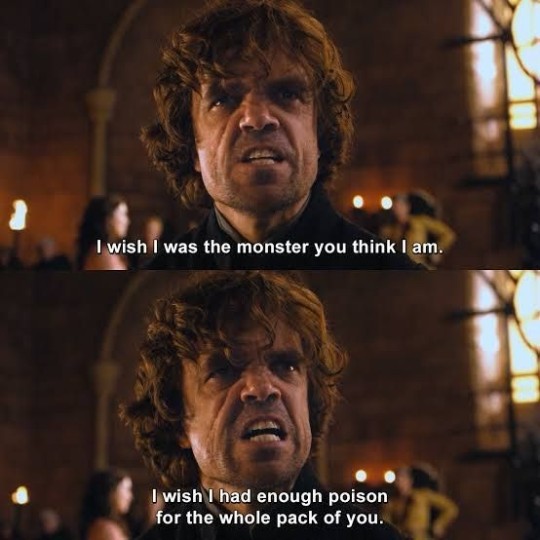
Nobody can really have a conversation with somebody when that person is rattling off about themselves or their dastardly plans etc. It's not really realistic but in fiction, we kind of want to allow characters to do on a little, to let loose and bare their soul in a speech worthy of Peter Dinklage's best work (Laws of Gods and Men, GoT Season 4). Personally I only give somebody monologuing a few minutes before I interrupt with the good old "that's crazy" or multiple "yeah"s. A character has to be captivated - or captive - to listen to somebody keep talking, talking, talking.
Interaction
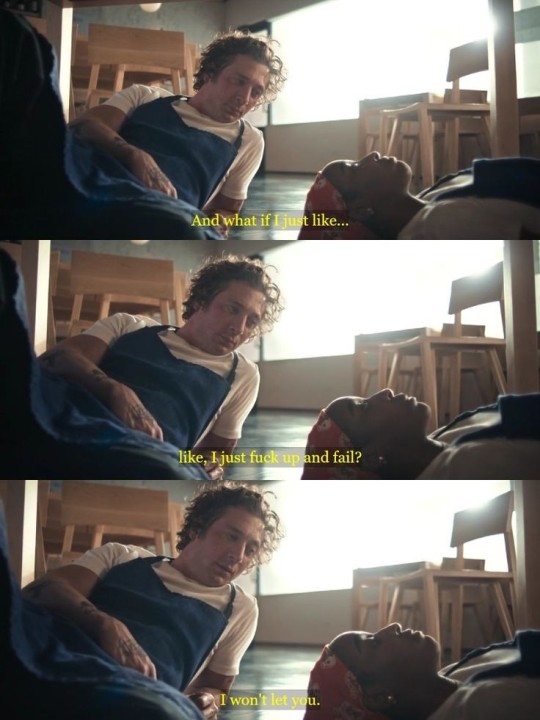
Again, your characters are meant to be real people, they are not robots on stage. When people are talking, it isn't perfect. When emotions are high, people will often cut across one another or interrupt one another. When characters are excited or in agreement, they might finish one another's sentences. The dialogue in The Bear, is fantastic for this as the interactions feel real. The characters interrupt one another, talk over one another and finish each other's thoughts. People follow a pattern of talking with people they know, they are less guarded and more prone to speaking their mind if they are comfortable with them or know what to avoid saying. People are more formal when speaking to strangers. People will speak differently to different people, there are things you can only say to your sibling and you wouldn't talk to a classmate you barely know the same way you will speak with a dear friend. The way character's interact can tell the reader a lot about the relationship between the characters.
#writing theory: dialogue#writing dialogue#writing guide#writing resources#writing reference#writeblr#writing advice#writing#writer's problems#spilled words#writer's life#writer#writers on tumblr#wtwcommunity#writeblr community#writing community#writers community#writers#creative writing#writers block#writing help#writing tools#writing tips
381 notes
·
View notes